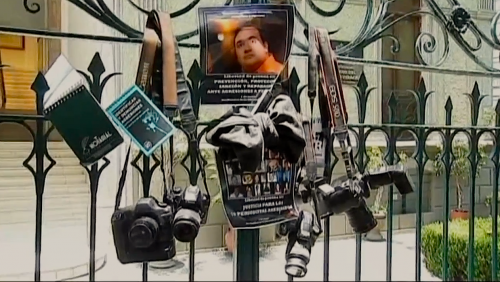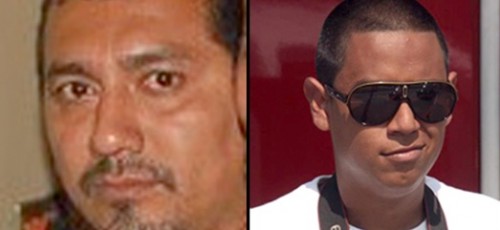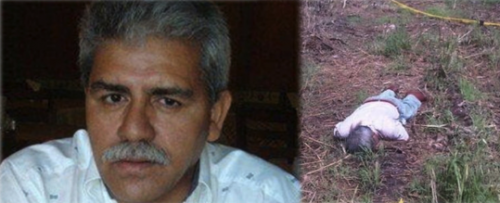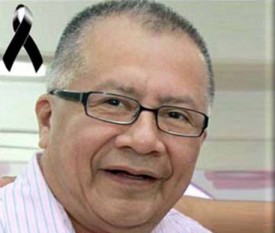2011 and 2012: Over a Dozen Mexican Journalists Killed
by Ryan Black / June 13, 2012 / No comments

Journalists leave their notebooks and cameras in front of an administrative building to show solidarity with their fallen peers. Photo: HispanTV.
In one of the world’s most dangerous countries for journalists, the Mexican press has suffered the disappearance and murder of dozens of media personnel over the past decade. The ongoing conflict between the military and rival drug cartels is fraught with complication and corruption, resulting in rampant and unpunished violence against reporters.
The violence against the press has intensified to the extent that some outlets have ceased reporting on drug violence altogether. The Committee to Protect Journalists (CPJ) lists 11 reporters who have been killed in Mexico in 2011 and 2012, but at least three others are absent from their count. Below Sampsonia Way lists the journalists who have lost their lives in the line of duty over the last two years. This list does not contain the names of those who have been abducted and not found.
May 18th, 2012.
Marco Antonio Àvila Garcìa, crime reporter for Diario Sonora de la Tarde and El Regional de Ciudad Obregon, was found dead outside the city of Empalme, state of Sonora. He had been kidnapped the day before 70 miles away in Ciudad Obregon. His body was accompanied by a message from a cartel and showed signs of torture. Avila’s news director says he was an experienced reporter who worked on drug trafficking stories, but never mentioned suspects by name.

Gabriel Huge Còrdova, left, and Guillermo Luna Varela, right, were found dead near a canal in Boca del Rio. Photo: Notiver.
May 3rd, 2012.
Gabriel Huge Còrdova and Guillermo Luna Varela were killed in Boca del Rio (Veracruz state). Huge and Luna had both previously worked for Notiver as photographers: Huge had moved into freelance work and Luna was working with Veracruznews at the time. Their bodies were found dismembered in trash bags along with those of two other individuals: Estaban Rodriguez and Irasema Becerra. Rodriguez, a former camera operator for TV-Azteca and photographer for local newspaper AZ, had left journalism and been working as a welder. Becerra was Luna’s girlfriend and was employed by newspaper El Dictamen, though not as a journalist.
April 28th, 2012.
Regina Martìnez Pèrez, a well-known and respected investigative journalist for national magazine Proceso, had reported on political corruption and organized crime for over a decade. She was found beaten and strangled inside her own home. The intruders had removed her computer, television, and mobile phones.
January 6, 2012.
Ràul Règulo Garza Quirino, a journalist for La Ùltima Palabra, was gunned down in his car not far from his home. La Ùltima Palabra does not focus on crime and the next day gunmen returned to the scene and killed his neighbor, who owned the same model car. Garza’s death was believed to be a case of mistaken identity.
September 24, 2011.
Maria Elizabeth Macìas Castro was found beheaded in Nuevo Laredo. She had posted about cartel activities on a local awareness website, and a computer mouse and keyboard were left beside her body, along with a note alluding to her internet activism signed by a drug cartel. She allegedly was the editor for newspaper Primera Hora, but the publication would not confirm she held a position there.
September 1, 2011.
Ana Marìa Yarce Viveros and Rocio Gonzàlez Tràpaga were found naked, strangled, and shot in a Mexico City park. Yarce was the founder of investigative biweekly magazine Contralìnea. Gonzàlez was a freelance reporter, previously with Televisa. Authorities have ruled the case a “femicide” and assert their deaths were not related to their professions.

Left: Millan, 53, before his death. Right: Millan's body as it was discovered. Photos: Al Instante and Borderland Beat.
August 24, 2011.
Humberto Millàn Salazar, writer for online news site A Discusion and host of a program on Radio Fòrmula was left in a field near Sinaloa with a gunshot wound to the head. Though Sinaloa is home to the Sinaloa cartel, colleagues allege his death likely had to do with his reporting on politics rather than drug trafficking.
July 26, 2011.
Yolanda Ordaz de la Cruz. A longtime police beat reporter for Notiver, Ordaz’s decapitated body was left in Veracruz outside the offices of another newspaper, Imagen. The state prosecutor received criticism for initially claiming that her killing was unrelated to her work and suggesting that she herself had links to organized crime. At the time of her killing she was believed to have been researching the death of Miguel Àngel Lòpez Velasco, who had been her boss.
June 20, 2011.
Miguel Àngel Lòpez Velasco and his son Misael Lòpez Solana were killed when gunmen burst into their Veracruz home early in the morning. Miguel, 55, was a prominent columnist and former deputy editor of Notiver. Misael, 21, worked as a photographer for the same publication. Miguel’s wife (Misael’s mother) was also killed in the attack.
March 25, 2011.
Luis Emanuel Ruiz Carrillo, writer for La Prensa, was kidnapped and found shot in Monterrey along with two other individuals, including Josè Luis Cerda Melèndez. Cerda was a popular television host that Ruiz had traveled to do a story about for La Prensa. Graffiti near the location of the bodies indicated that the killings were related to a drug cartel, and Cerda was likely the intended target. An incidental victim, Ruiz was 21 years old.
March, 2011.
Noel Lòpez Olguìn, a columnist for La Verdad de Jàltipan, was kidnapped on March 8th and found on May 31st in Chinameca, buried in a clandestine grave. His column, “Con pluma de plomo” (With a Lead Pen) contained aggressive and specific coverage of drug crimes and political corruption. An arrested gang leader confessed to the killing and led authorities to his grave.





